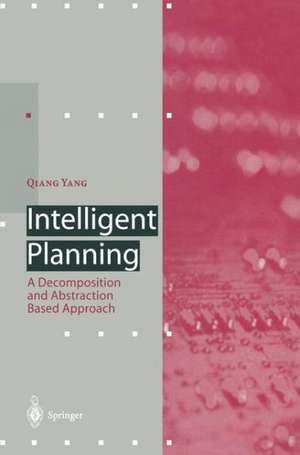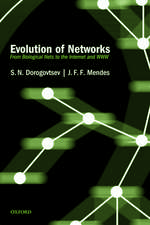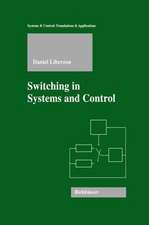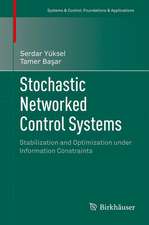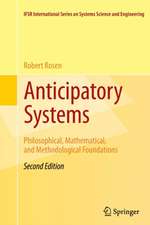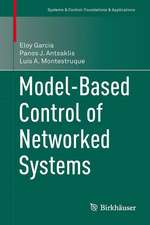Intelligent Planning: A Decomposition and Abstraction Based Approach: Artificial Intelligence
Autor Qiang Yang Cuvânt înainte de M. Pollacken Limba Engleză Paperback – 28 sep 2011
Din seria Artificial Intelligence
- 8%
 Preț: 218.19 lei
Preț: 218.19 lei -
 Preț: 78.18 lei
Preț: 78.18 lei - 20%
 Preț: 862.95 lei
Preț: 862.95 lei -
 Preț: 78.18 lei
Preț: 78.18 lei -
 Preț: 78.18 lei
Preț: 78.18 lei - 20%
 Preț: 855.98 lei
Preț: 855.98 lei - 20%
 Preț: 365.80 lei
Preț: 365.80 lei - 20%
 Preț: 641.01 lei
Preț: 641.01 lei - 20%
 Preț: 555.53 lei
Preț: 555.53 lei - 20%
 Preț: 324.64 lei
Preț: 324.64 lei - 20%
 Preț: 342.28 lei
Preț: 342.28 lei - 20%
 Preț: 330.24 lei
Preț: 330.24 lei - 20%
 Preț: 659.97 lei
Preț: 659.97 lei - 20%
 Preț: 375.15 lei
Preț: 375.15 lei - 20%
 Preț: 661.47 lei
Preț: 661.47 lei - 20%
 Preț: 654.70 lei
Preț: 654.70 lei - 20%
 Preț: 1006.48 lei
Preț: 1006.48 lei - 20%
 Preț: 647.79 lei
Preț: 647.79 lei - 15%
 Preț: 638.89 lei
Preț: 638.89 lei - 20%
 Preț: 1001.16 lei
Preț: 1001.16 lei - 20%
 Preț: 650.27 lei
Preț: 650.27 lei - 20%
 Preț: 330.42 lei
Preț: 330.42 lei - 20%
 Preț: 834.69 lei
Preț: 834.69 lei - 20%
 Preț: 326.46 lei
Preț: 326.46 lei - 20%
 Preț: 757.48 lei
Preț: 757.48 lei - 20%
 Preț: 642.19 lei
Preț: 642.19 lei - 20%
 Preț: 328.27 lei
Preț: 328.27 lei - 20%
 Preț: 339.99 lei
Preț: 339.99 lei - 20%
 Preț: 342.96 lei
Preț: 342.96 lei - 20%
 Preț: 648.44 lei
Preț: 648.44 lei - 20%
 Preț: 657.99 lei
Preț: 657.99 lei - 20%
 Preț: 654.55 lei
Preț: 654.55 lei - 20%
 Preț: 639.35 lei
Preț: 639.35 lei - 20%
 Preț: 656.03 lei
Preț: 656.03 lei - 20%
 Preț: 1000.50 lei
Preț: 1000.50 lei - 20%
 Preț: 338.81 lei
Preț: 338.81 lei - 20%
 Preț: 709.98 lei
Preț: 709.98 lei - 20%
 Preț: 652.73 lei
Preț: 652.73 lei - 20%
 Preț: 344.93 lei
Preț: 344.93 lei - 20%
 Preț: 653.06 lei
Preț: 653.06 lei -
 Preț: 394.29 lei
Preț: 394.29 lei
Preț: 331.58 lei
Preț vechi: 414.48 lei
-20% Nou
Puncte Express: 497
Preț estimativ în valută:
63.46€ • 68.90$ • 53.30£
63.46€ • 68.90$ • 53.30£
Carte tipărită la comandă
Livrare economică 22 aprilie-06 mai
Preluare comenzi: 021 569.72.76
Specificații
ISBN-13: 9783642644771
ISBN-10: 3642644775
Pagini: 280
Ilustrații: XXII, 252 p.
Dimensiuni: 155 x 235 x 15 mm
Greutate: 0.4 kg
Ediția:Softcover reprint of the original 1st ed. 1997
Editura: Springer Berlin, Heidelberg
Colecția Springer
Seria Artificial Intelligence
Locul publicării:Berlin, Heidelberg, Germany
ISBN-10: 3642644775
Pagini: 280
Ilustrații: XXII, 252 p.
Dimensiuni: 155 x 235 x 15 mm
Greutate: 0.4 kg
Ediția:Softcover reprint of the original 1st ed. 1997
Editura: Springer Berlin, Heidelberg
Colecția Springer
Seria Artificial Intelligence
Locul publicării:Berlin, Heidelberg, Germany
Public țintă
ResearchCuprins
1. Introduction.- 1.1 The Problem.- 1.2 Key Issues.- 1.3 Planning Versus Scheduling.- 1.4 Contributions and Organization.- 1.5 Background.- I. Representation, Basic Algorithms, and Analytical Techniques.- 2. Representation and Basic Algorithms.- 3. Analytical Techniques.- 4. Useful Supporting Algorithms.- 5. Case Study: Collective Resource Reasoning.- II. Problem Decomposition and Solution Combination.- 6. Planning by Decomposition.- 7. Global Conflict Resolution.- 8. Plan Merging.- 9. Multiple-Goal Plan Selection.- III. Hierarchical Abstraction.- 10. Hierarchical Planning.- 11. Generating Abstraction Hierarchies.- 12. Properties of Task Reduction Hierarchies.- 13. Effect Abstraction.- References.
Textul de pe ultima copertă
This monograph on planning based on Artificial Intelligence methods may serve both as an advanced textbook and as a general reference book. AI planning is an active research and applications field concerned with action and plan representation, plan synthesis and reasoning, analysis of planning algorithms, plan execution and monitoring, and plan reuse and learning.
The book provides a clear, thorough coverage of key areas of classical AI planning. Its main theme is to build more intelligence on a set of basic algorithms and representations for planning. It presents advanced techniques for plan generation using decomposition and plan merging and for analyzing and comparing planning algorithms. The book contains illustrations, examples, algorithms, analyses, tables, and extensive references.
The book provides a clear, thorough coverage of key areas of classical AI planning. Its main theme is to build more intelligence on a set of basic algorithms and representations for planning. It presents advanced techniques for plan generation using decomposition and plan merging and for analyzing and comparing planning algorithms. The book contains illustrations, examples, algorithms, analyses, tables, and extensive references.
